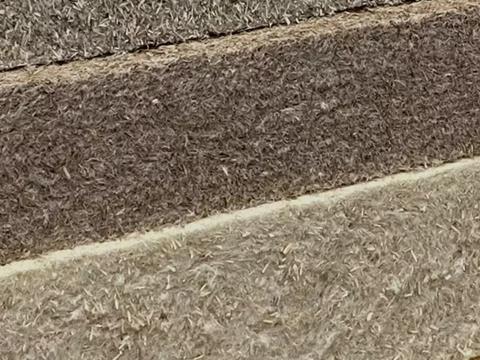
A seed funding round led by Metsä Spring, the innovation arm of Metsä Group, is set to fund Fiberwood – a Finnish start-up and producer of insulation and packaging materials from side streams of the mechanical wood industry – and enable scaled-up production capabilities at its pilot plant.
Fiberwood’s cushioning and protection sheets are thought to serve a similar function to Styrofoam, preventing damage to products in transit. Manufactured with foam-forming technology, they claim to be bio-based, plastic-free, and compostable, biodegrading into soil at end-of-life without leaving microplastics behind.
Air pockets are said to enhance the insulation capabilities of the sheets, which are also reported to be carbon negative as they bind carbon dioxide to the wood itself for as long as the product exists. They apparently undergo ‘no meaningful warpage’ and remain effective amongst changing conditions, and are designed for easy, safe, and quick installation.
Fiberwood is expected to provide a more sustainable alternative to the inorganic mineral wools and fossil-based cellular plastic products currently dominating the €25 billion global insulation market. In turn, as the company estimates a 20% increase in wood construction within EU countries by 2050, the sheets are hoped to reduce carbon emissions for the construction industry.
With the additional contribution of public financing from Business Finland, Metsä Spring’s seed funding is hoped to support Fiberwood in a transition towards the industrial-scale production of its packaging and insulation materials.
“Since last September, in our first phase of production, we have been able to produce commercial-sized insulation boards for testing,” explains Karita Kinnunen-Raudaskoski, director of Technology and Product Development at Fiberwood. “Next, we will build a continuous pilot line for production-scale product and process development. As no existing machinery and processes can produce our products, we need to invent new technology to do so.
“Our innovative foam-forming production process is more energy-efficient and uses less water than similar processes in general, so we promote the goal of sustainable development by using side streams, producing high-value products energy-efficiently, and promoting wood construction.”
“We are contributing towards a more sustainable future by using side streams, producing high-value products energy efficiently, and by accelerating the potential of wood-based construction,” continues Tage Johansson, Fiberwood’s CEO. “We are grateful to our investors for believing in our product’s potential, and for the opportunity to use Metsä Group’s forest industry side streams as raw material.”
“Fiberwood has developed a one-of-a-kind technology that utilises renewable raw materials from sustainable forest sources,” says Erik Kolehmainen, vice president of Corporate Venturing at Metsä Spring. “Metsä Group wants to support the most efficient utilisation of side streams. The world needs new innovations to support the circular economy, and it is innovations like this that we want to support.”
Last year saw various developments in packaging insulation, from Dufaylite’s thermally insulated box liners and inserts made of recycled paper honeycomb to Smurfit Kappa’s recyclable corrugated cardboard insulation packs for Mindful Chef’s home-delivered recipe boxes.
UPM Raflatac also announced that the PET plastic liner waste it had collected through its recycling service would be processed into a raw material by Inosence Polyol and turned into insulation by Finnfoam.














No comments yet